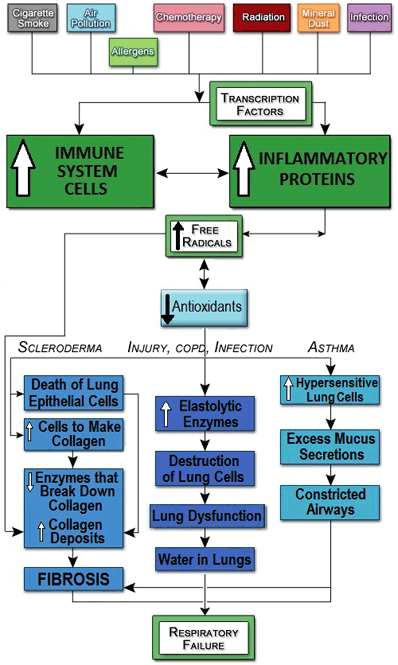Turmeric Could Help Keep Lungs Healthy

Inflammation in many lung conditions constricts the airways and makes it difficult to breath. This is often related to an exaggerated response by the immune system that leads to chronic inflammation and damage to lung tissue by free radicals. (v.23, 201)
Many of the compounds in turmeric have anti-inflammatory and antioxidant properties. Some turmeric compounds may also help directly regulate the immune system. Research indicates that they could help prevent or reduce symptoms of lung conditions. These diseases include: (v.23, 201-206)
- Asthma.
- Chronic obstructive pulmonary disorder (COPD).
- Emphysema caused by enzyme inhibitor deficiency, cigarette smoke, and nicotine.
- Pneumonia or other acute infections such as bronchitis in the lungs.
- Lung fibrosis caused by radiation or paraquat lung.
- Pleurisy.
- Severe injury from heart arrhythmia or chemotherapy drugs (e.g., amiodarone, bleomycin, cyclophosphamide).
In addition, over 380 different pharmaceutical medications can cause pulmonary injury. Many of these injuries are life threatening because they lead to lung fibrosis. Most people who develop lung fibrosis only live 3-6 years after the onset of symptoms. (v.203, 207-208)

Figure V.4: Inflammation and Free Radicals in Various Lung Conditions
What is Lung Fibrosis?
Inflammation in the lungs is caused by a flood of immune system cells and inflammatory cytokine proteins produced in response to injury, toxins, allergens, and infection. This is a normal immune system response that helps the body get rid of foreign substances and heal. (v.23, 201-206, 209-210)
However, if the immune system is overwhelmed it becomes a chronic inflammatory lung condition. The inflammation and free radicals the immune system used to attack, for example, bacteria and viruses, now start damaging cells in the lung. The immune system cells also stimulate an overproduction of lung cells that cause a buildup of fibrotic scar tissue or water in the lungs. It's easy to see how a dysfunctional immune system can become a destructive process. (v.23, 201-206, 209-210)
Conventional Treatment Problems
Unfortunately, effective conventional treatments for fibrotic lung conditions are unsatisfactory. Some, such as cyclophosphamide chemotherapy used to treat scleroderma, can actually cause additional lung fibrosis. Cyclophosphamide-induced lung fibrosis has a 50% mortality rate. (v.207-208, 211)
Other conventional treatments are typically anti-inflammatory and immunosuppressant corticosteroids such as prednisone. These usually produce marginal treatment benefits and come with their own set of potential adverse side effects. (v.203, 207-208)
How Can Turmeric Help?
Turmeric and its curcumin compounds are safe and have potent anti-inflammatory effects. Studies show turmeric compounds do not interfere with antibacterial and other treatment activity of conventional drugs for lung conditions. (v.23, 203, 207-208)
In fact, researchers suggest turmeric's curcumin compounds could actually help make taking these potentially toxic medications safer and more effective. Curcumin suppresses pro-inflammatory proteins, helps quench free radicals, and boosts natural antioxidant levels. In animal studies, curcumin helped prevent further lung injury from conventional drugs. (v.23, 203, 207-208)
Join the 1000s of People Who Are Discovering the Benefits of Turmeric.

Healthceuticals® Turmeric Curcumin Complex
100% Certified
Organic ingredients
- Organic Turmeric Extract - standardized to 95% curcuminoids.
- Organic Whole Turmeric - provides full spectrum antioxidant, anti-inflammatory turmeric benefits, including turmerones and numerous vitamins, minerals, and phytonutrients
- Organic Black Pepper Extract - standardized to 95% piperine; dramatically enhances bioavailablity.
- Organic Phospholipids - markedly improve absorption.
- Organic Ginger - works synergistically with turmeric to provide more powerful benefits.
- Absolutely FREE of potentially harmful additives and fillers such as magnesium stearate.



